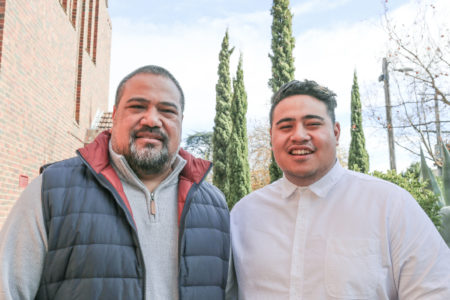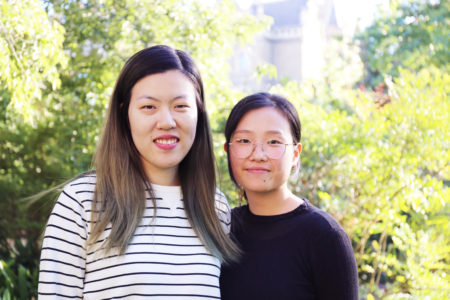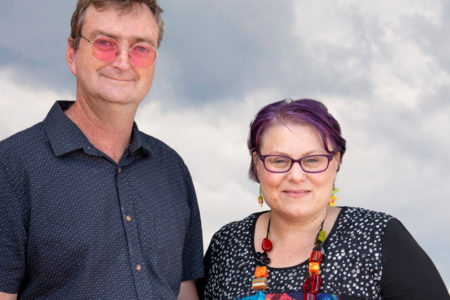Uniting Housing has been providing affordable accommodation to vulnerable people for the past 10 years. We speak with outgoing CEO Ian Brain and grateful tenant, William Clark, 21.
Ian Brain
This year I am retiring as CEO of Uniting Housing, a job I have had for about six-and-a-half years. Uniting Housing provides affordable and social housing to people with a lack of secure accommodation. Currently we provide tenancy and property management for about 350 properties across Victoria.
There’s been several memorable moments in my time at Uniting Housing. We built four single units in Ballarat and made them accessible to people on Newstart. At the same time as we opened that and had our first tenants in, a young local family, who had been sleeping in their car, died. They had a gas heater going.
One of our tenants said “that could have been me, that’s what I was at risk of”. If you’re forced to live in those sorts of situations then you’re dabbling with danger. The fact that what we were able to give that person some refuge was a marvellous moment, one that we, the whole church, should share in.
We’ve obviously got a crisis on our hands when it comes to housing, but (as a society) we’re not prepared to bite the bullet and be effective about it. We need a different attitude towards housing. It’s seen as an investment vehicle, whereas if it was looked at as a response to need we would deal with the issue in a very different way. However, we have a highly competitive, capital-motivated approach to housing and it is costing us. This crisis has been brewing for 30 years.
It’s because of political will, lack of vision, lack of insight, lack of listening. Lack of insight, I think is the biggest cause.
The difference between social and affordable housing comes down to eligibility. Affordable housing is for people on lower incomes who are ineligible for benefits. They’re typically entry level school teachers, nurses, police, emergency services, etc. Then the rent is calculated as 80 per cent of the market rent.
People who might be on a benefit or a low income may be eligible for social housing. That’s calculated as 25 per cent of their income, plus rent assistance. Their rent is not charged any more than that. That’s not a lot of income, particularly for someone on the Newstart allowance.
It’s very challenging to provide sustainable housing under those terms. In the general sense, everybody benefits from Uniting Housing. The effort towards provision of housing will deal with a myriad of issues. If there’s housing available then we won’t have people on the streets sleeping rough.
Housing gives stability to an individual who, from that position, can then begin to address other elements and circumstances of their life.
There’s always a balance where what we’re trying to do mixes supplying housing with further support activities. We haven’t got the whole problem solved by simply providing housing.
I’ve been in the welfare field almost all of my working life. I chose to take that as a direction in my mid-20s. I started off as a youth worker, working with government and then with a Methodist organisation called Grassmere.
One of the great opportunities you get working in this field is the chance to do good work with good people. That is a life pleasure, it’s wonderful to have that as your working environment.
Uniting Housing Victoria is something to be protected and nurtured. I’m passing the CEO position on into good hands. We are passing on something that’s solid, that demonstrates we can effectively develop and maintain sustainable housing.
What we need now is to scale it up. Together with Uniting Vic.Tas those pieces will potentially come together. It will be a very different organisation in 10 years and it will be something that I will be very proud of.
In conjunction with Uniting Vic.Tas, we’re looking at Tasmania now. We need to get national accreditation to get down there, but we’re undertaking that this year.
I am optimistic and hopeful. I don’t know how I could cope with being pessimistic with regard to Australia’s attitude towards this issue.
William Clark
I live in Uniting Housing accommodation in Mt Pleasant built especially for 16 to 25-year-olds.
I share one of the five two-bedroom townhouses with my housemate, Adrian. I’ve lived here for just over five months. Before that I was living with my sister, but I wasn’t able to stay there due to family conflict.
My sister’s boyfriend told me about Uniting Housing so I went in and applied. Eventually, I got a call back saying a spot had opened and I jumped at the chance.
I didn’t know Adrian beforehand, but it’s going really well.
I do all the cooking, but that’s OK because I really enjoy cooking. We get our own bedrooms and share a bathroom. Ocasionally all of us who live in the townhouses get together to cook and share a meal.
We have a bus stop basically at the end of our driveway and the train is a 20 minute walk away, so getting around is pretty good.
I am going for my driver’s licence this month. I hope to get it because it would provide more opportunities for jobs. At the moment I’m not working.
I was expelled twice from high school and never finished, but this year I will start a Certificate IV in Youth Work. My goal is to work with young people, I want to help those who are in disadvantaged situations like what I experienced during my childhood.
I grew up in the foster care system. I first entered it at six months old. Thankfully, my sisters and I got to stay together in the system. I’ve been watched over by the government for most of my life, really. I have no contact with my birth parents, but am close with one of my sisters. I barely speak to my other sister, who lives in NSW.
I grew up in a very rough area and experienced a lot of abuse as a child. I lived on the streets in NSW for about six months after being kicked out by my dad, who is definitely not a nice person.
I had no way of contacting my sister, who was already living here in Victoria and it took about four months for support services to get back to me. All of this contributed to my depression and anxiety, which I still struggle with on a daily basis. I also have bipolar disorder.
The support that I get living here helps with that a lot. They can advocate for us in situations where we don’t feel comfortable or don’t feel up to it at that time. Uniting Housing helps us with licences, courses and jobs as well.
Housing projects like this are so important because, talking from experience, people in my position, or even worse positions, there is not much support for us out there other than places like this.
But in saying that there’s only limited spots at the moment, which is why, in my opinion, we need a lot more of this sort of thing – just the security of having your own place to go and not being out on the street where anything could happen.
It is a big boost to your self-confidence and mental wellbeing. Before coming here, I did feel a bit forgotten – on the street especially.
My life has changed since moving here. I have a lot more confidence in myself. I’m looking forward to doing things in the future.
I’m doing a lot better than I was before I came here. I feel hopeful for my future




